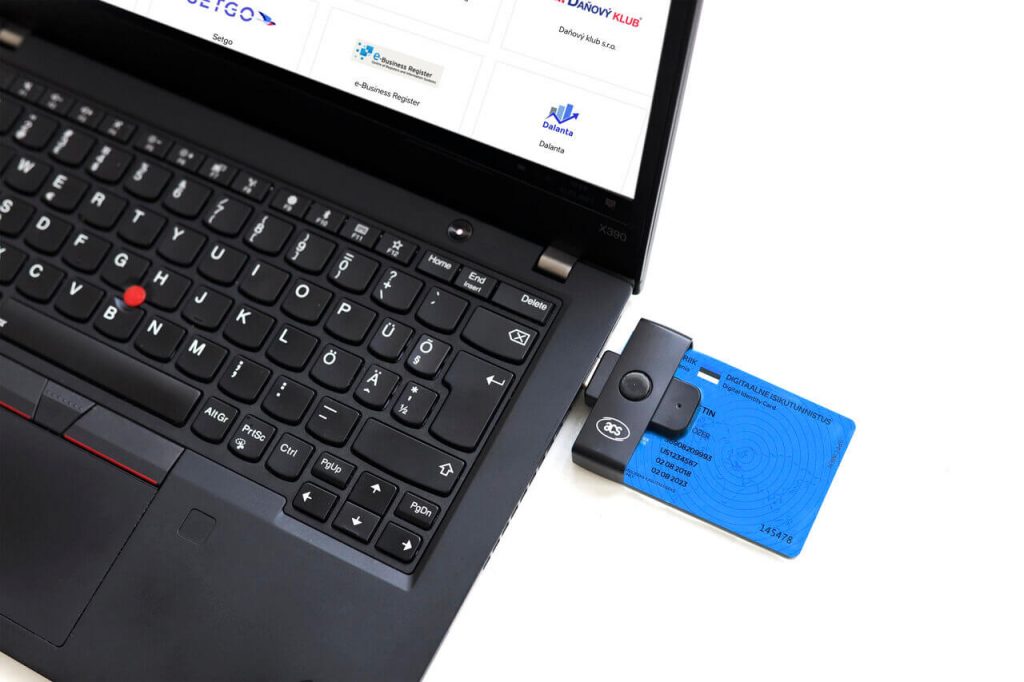comparing estonian and lithuanian e-Residency
What are the main differences between Estonia's seven-year old e-Residency programme and the new kid on the block from Lithuania?

As of 21 June 2021 foreigners have been able to apply for e-resident status in Lithuania, receive an e-resident card and e-ID certificate. This allows them to make use of the electronic administrative, public or commercial services provided in Lithuania.
The Lithuanian e-residency program is just the latest in a growing marketplace. Estonia launched its highly popular e-Residency program, the first of its kind, back in 2014 and it has since grown to be the program to beat.
What does the Lithuanian program have to offer? Is it better than Estonian e-Residency? Which should you choose? These are all questions we aim to answer in this article. Read on to find out!
This article was written by InCorpora, a full-service firm providing tailor-made corporate, accounting, back-office, and banking support services to e-resident company owner. Contact InCorpora via their website:
What is e-Residency?
In December 2014, Estonia was the first country in the world to introduce e-Residency. The program allows non-Estonians to have remote, digital access to a range of e-services such as company formation, banking, payment processing, and taxation. E-residents receive a digital ID card, which they can use to securely authenticate themselves online and digitally sign, encrypt and send documents.
Thanks to e-Residency, it’s possible for a Chinese entrepreneur to establish an Estonian company that can be run from Shanghai and serve their clients based in France, for example. Everything is handled online, remotely, and totally hassle-free.
Why Estonia?
Estonia has become a hub for industrial and logistics activities and is a world leader in IT. The country is uniquely positioned as a scalable location of choice for knowledge and digital business.
Some highlights:
- A member of the EU, eurozone and NATO, Estonia is politically and economically stable and secure.
- Estonia is the world’s most digitally enabled nation, offering experienced talent, a stable environment, and innovation at its core.
- Estonia is a near cashless society with over 99% of financial transactions happening digitally.
- With a highly-qualified workforce, specialising in engineering, electronics and IT, Estonia is at the cutting edge of R&D.
- Estonia developed the X-Road, its proprietary decentralised, distributed system in 2001 and has utilised Blockchain since 2008.
Benefits of Estonian e-Residency
The Estonian e-Residency program allows you to:
- Apply online and pick up your digital ID card from one of 45 collection points around the world
- Establish an EU-based company, 100% online from anywhere in the world and manage it remotely
- Expand or keep your business in the EU
- Declare taxes or open an Estonian business banking or fintech account
- Be granted e-resident status for a period of 5 years
- Pay and receive payments using convenient online banking tools
- Go paperless with secure digital solutions
- Automate or delegate business administration with the help of members of the e-Residency Marketplace
- Network with over 90,000 like-minded e-resident entrepreneurs
Learn more about the benefits of Estonian e-Residency on their website:
Why Lithuania?
Lithuania is a country with a rich history. It has long been a great place to do business, ever popular due the low costs of accounting and administration, low taxes and good geographical position.
Some highlights:
- It’s also a member of NATO, the EU and the Eurozone.
- Lithuanian, Russian, English, and Polish languages are widely spoken, making it easier to converse.
- The country is ranked 11th globally for Ease of Doing Business and has become a major hub for the fintech sector.
- The New York Times ranks Vilnius alongside Copenhagen, Barcelona and Capetown as a trendy and well-managed place to live.
Lithuanian e-residency
The Lithuanian e-residency program allows you to be granted e-resident status in the Register of Foreigners for a period of 3 years.
Lithuanian e-Residency is still in its very early stages and foreigners can only do very basic things right now. For example, the only thing a foreigner can do with a Lithuanian e-Residency card is to log into the government e-services and give digital signatures. They cannot register companies, nor can they open a business bank account or take advantage of the tax system.
Plus, in order to apply for the e-residency status in Lithuania, you currently need to travel there to do so. Then, when your card is ready to be picked up, you will need to travel there again. For many people at the moment, this is made all the more difficult with covid travel restrictions in place.
Estonia vs. Lithuania — which program is better?
Here are the main differences between the Estonian and Lithuanian programs and business environments.
e-Residency - Estonia vs. Lithuania
Online application
Cost of application
Community size
Application time
Dedicated e-Residency team + infrastructure
Ecosystem of service providers for e-residents
Supported languages
Ease of Doing business rating (2020)
Ease of Paying Taxes (2020)
Cost of starting a business
Minimum share capital down payment
Annual company running costs
Corporate tax rate
Double tax treaties
Yes
€100 – €130
90,000+ e-residents to date
Up to 30 mins
Yes
Yes
Estonian, English, Russian
18th
4th
€265
0%
Legal address + contact person €120-€730
0% / 14% / 20%*
61
Yes
€90
None
10-15min
No
No
Lithuanian, English, Russian
11th
6th
€73
25%
Legal address €45-€500
5% / 15%**
57
Online application
Yes
Yes
Cost of application
€100 – €130
€90
Community size
90,000+ e-residents to date
None
Application time
Up to 30 mins
10-15min
Dedicated e-Residency team + infrastructure
Yes
No
Ecosystem of service providers for e-residents
Yes
No
Supported languages
Estonian, English, Russian
Lithuanian, English, Russian
Ease of Doing business rating (2020)
18th
11th
Ease of Paying Taxes (2020)
4th
6th
Cost of starting a business
€265
€73
Minimum share capital down payment
0%
25%
Annual company running costs
Legal address + contact person €120-€730
Legal address €45-€500
Corporate tax rate
0% / 14% / 20%*
5% / 15%**
Double tax treaties
61
57
Notes to table:
* Corporate Tax Rate in Estonia is 0% until dividend distribution, and flat 14% or 20% at corporate profit distribution. Estonia has a deferred corporate tax system.
** Corporate tax rate in Lithuania is 5% if annual income less than €300k & up to 10 employees.
*** There might be circumstances when a Tax Authority in another country may consider your Estonian or Lithuanian company liable to pay corporate taxes there too – meaning it has dual tax residency. For example, if you spend a lot of time in one country or conduct most of your activities for the company there (e.g. do client work, hire staff or maintain an office), a Tax Authority may consider that your company has formed a Permanent Establishment (PE). Neither e-Residency program will exempt your company from creating PEs in other countries.
As you can see, there are a number of differences between the programs and it can come down to the scale of your business and how location independent you need to be. Estonian e-Residency can be applied for totally online and the card picked up from one of 45 collection points around the world. In contrast, in order to apply for e-residency status in Lithuania, you need to travel there to do so, and again to pick up the card. For many people at the moment, this is made all the more difficult with the myriad of covid travel restrictions in place.
Generally speaking, Lithuania’s fee is slightly cheaper than Estonia’s, but the Estonian program offers significantly more services to its e-residents, e.g. online company registration, remote business management, submitting online tax declarations, and being able to use Smart-ID to sign documents in state portals.
Applying for Lithuania’s e-residency program is four times faster than Estonia’s, but — crucially — this is largely because the Lithuanian program is significantly less comprehensive. The Lithuanian program is very much in its infancy and offers considerably fewer advantages and benefits to participants than its Estonian contemporary.
For example, a Lithuanian e-residency card simply grants a foreigner the ability to log into the government’s e-services portal and use digital signatures. Individuals cannot yet register companies, nor can they open a business bank account or take advantage of the local tax system.
With a dedicated team and infrastructure, a maturing ecosystem of expert service providers, a growing community of over 90,000 e-residents who have started 20,000+ businesses, and the fact that almost all of Estonia’s online infrastructure is available in English and Russian, Estonian e-Residency is still the one to beat.
Take your first step with Incorpora
If you’re looking to establish a company in Estonia, InCorpora is ready and waiting to help.
Take the first step and get in touch with us today to book your free 15-minute consultation about e-Residency.
Setting up an Estonian entity couldn’t be more straightforward, thanks to our dedicated team. Our tailored package covers all aspects of company establishment in Estonia, including:
- Setting up an IBAN for borderless banking;
- Boosting substance with payroll, leased office, etc.;
- Giving you limited liability;
- VAT registration, if required;
- Producing a tax residence certificate within 2 days;
- Setting up payment gateways.
Company registration takes as little as one week.
This guest post was written by InCorpora, a full-service firm providing tailor-made corporate, accounting, back-office, and banking support services to e-resident company owners, and a trusted e-Residency Marketplace member.

